牛津上海版英语九年级下八大时态专题讲解及练习(含答案)
文档属性
| 名称 | 牛津上海版英语九年级下八大时态专题讲解及练习(含答案) | 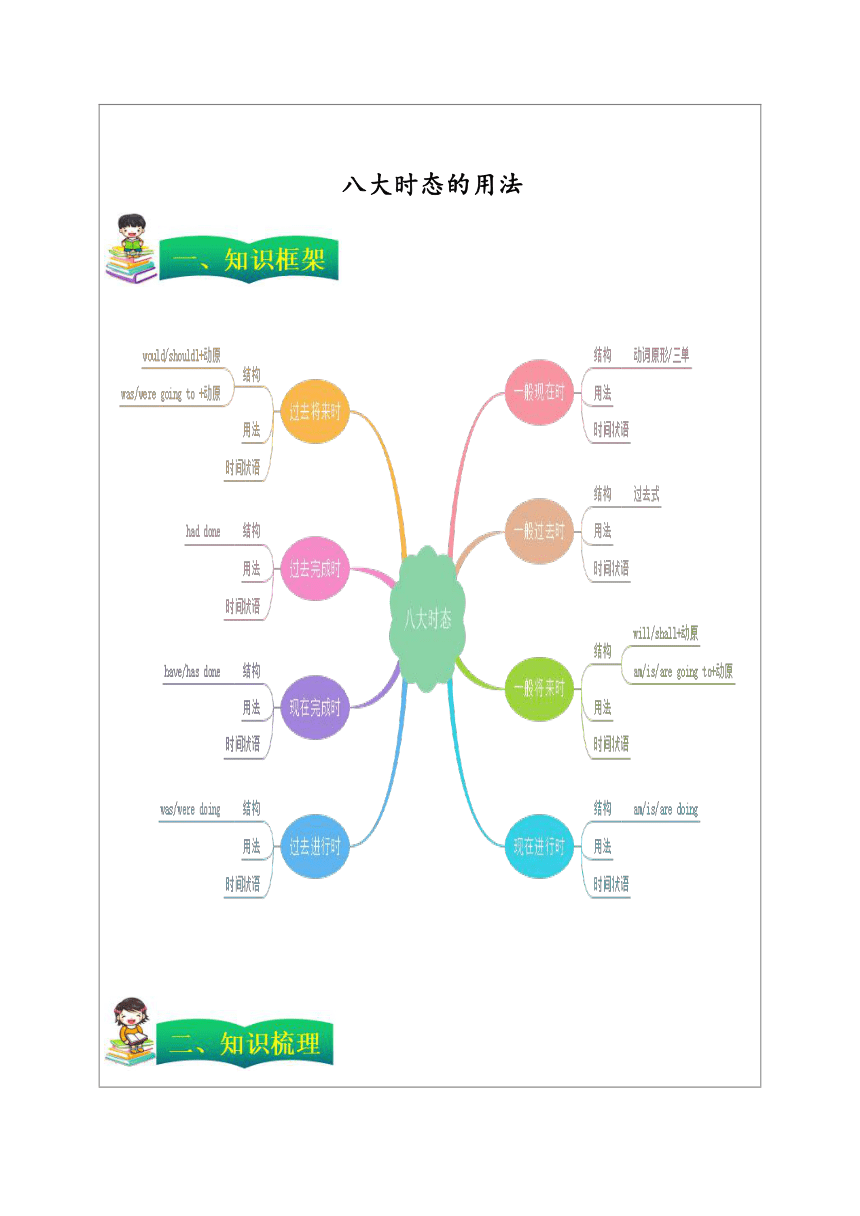 | |
| 格式 | zip | ||
| 文件大小 | 186.5KB | ||
| 资源类型 | 教案 | ||
| 版本资源 | 牛津上海版(试用本) | ||
| 科目 | 英语 | ||
| 更新时间 | 2020-06-05 00:08:54 | ||
图片预览

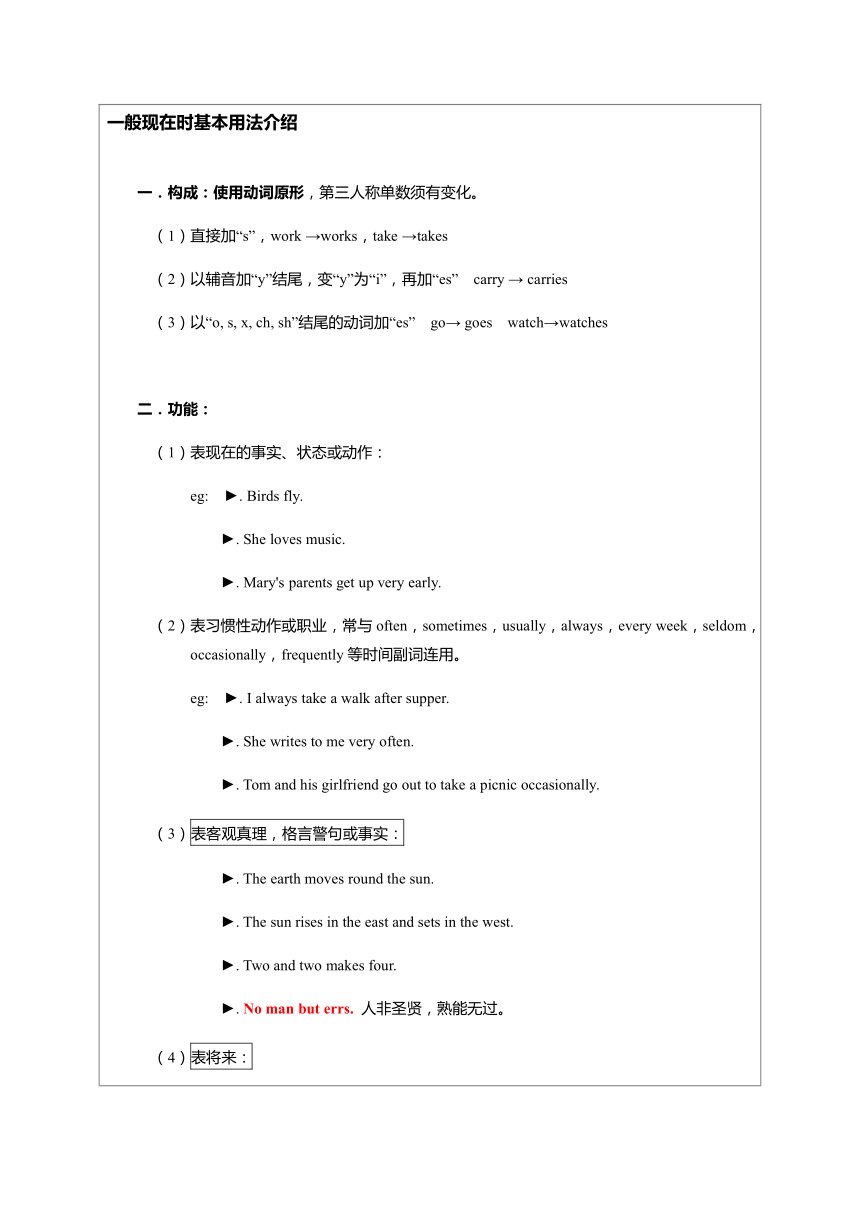
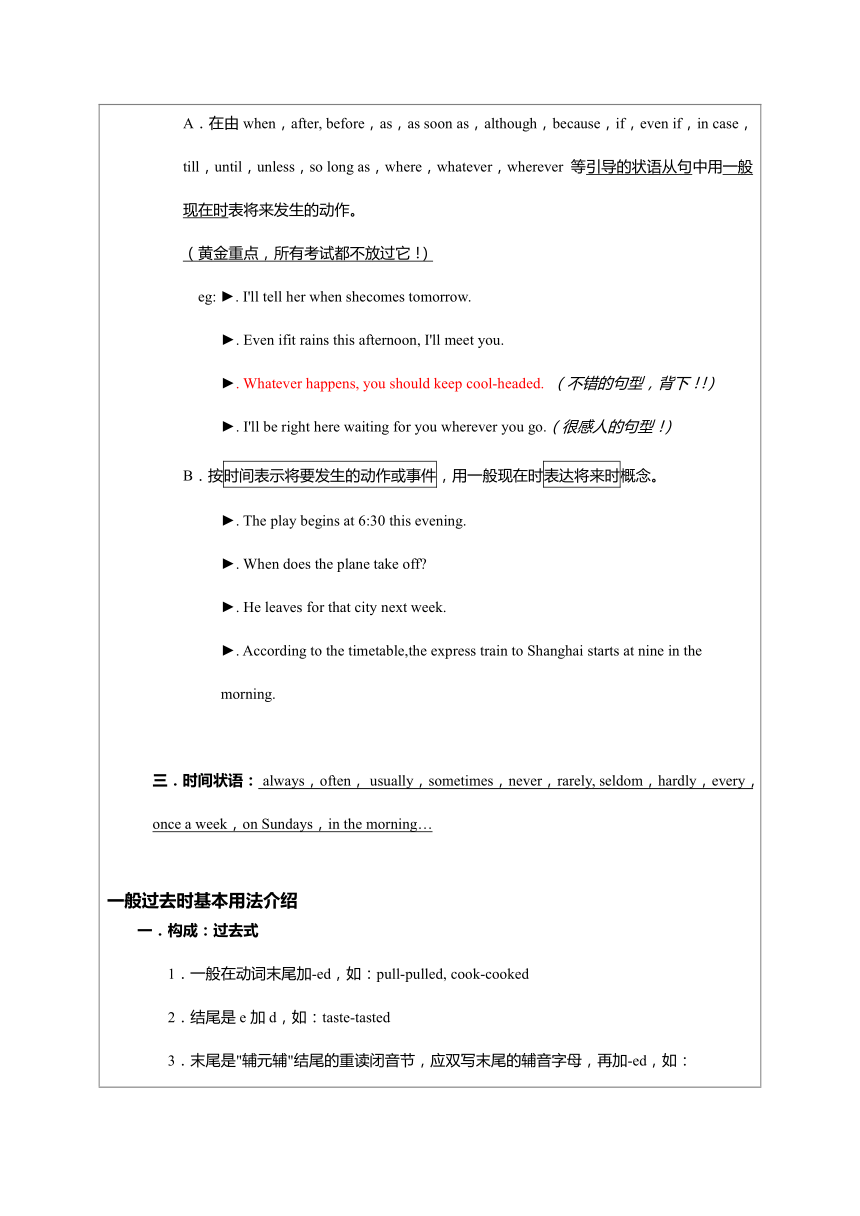
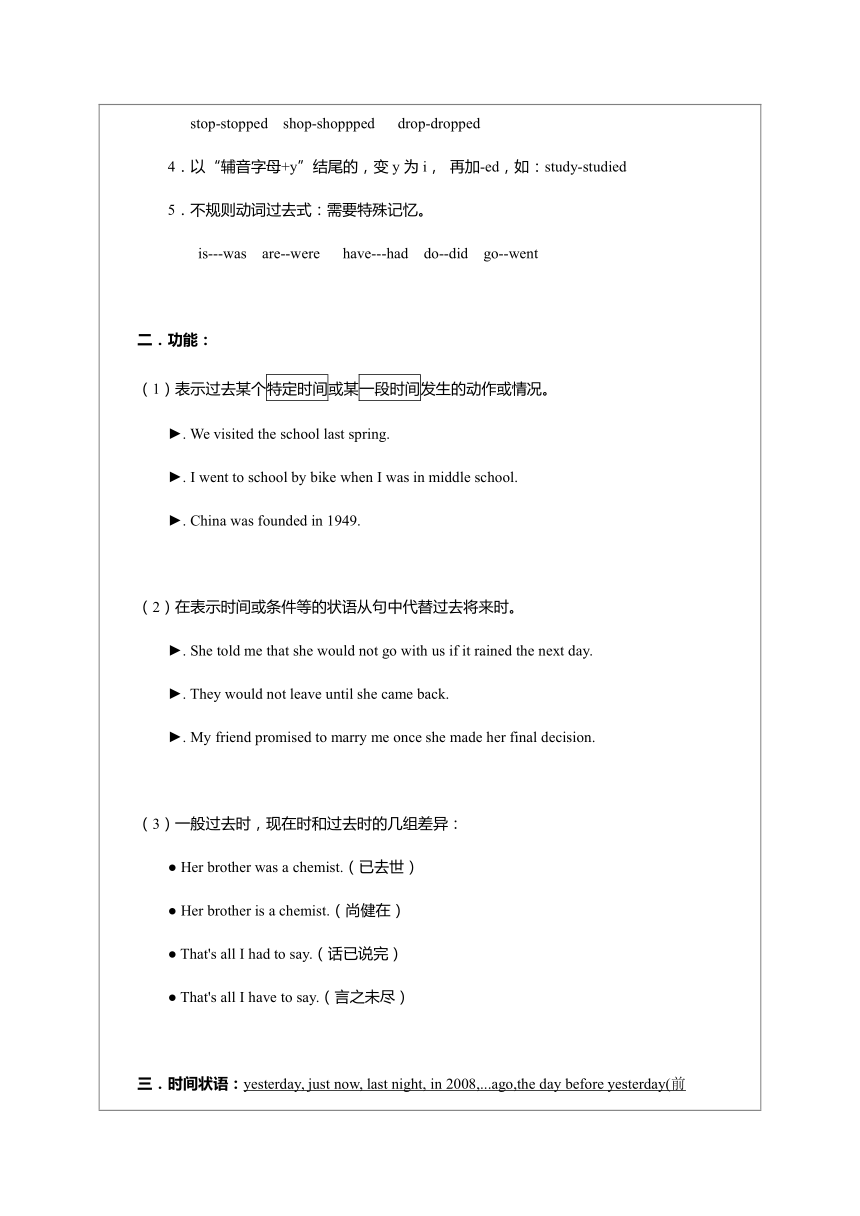
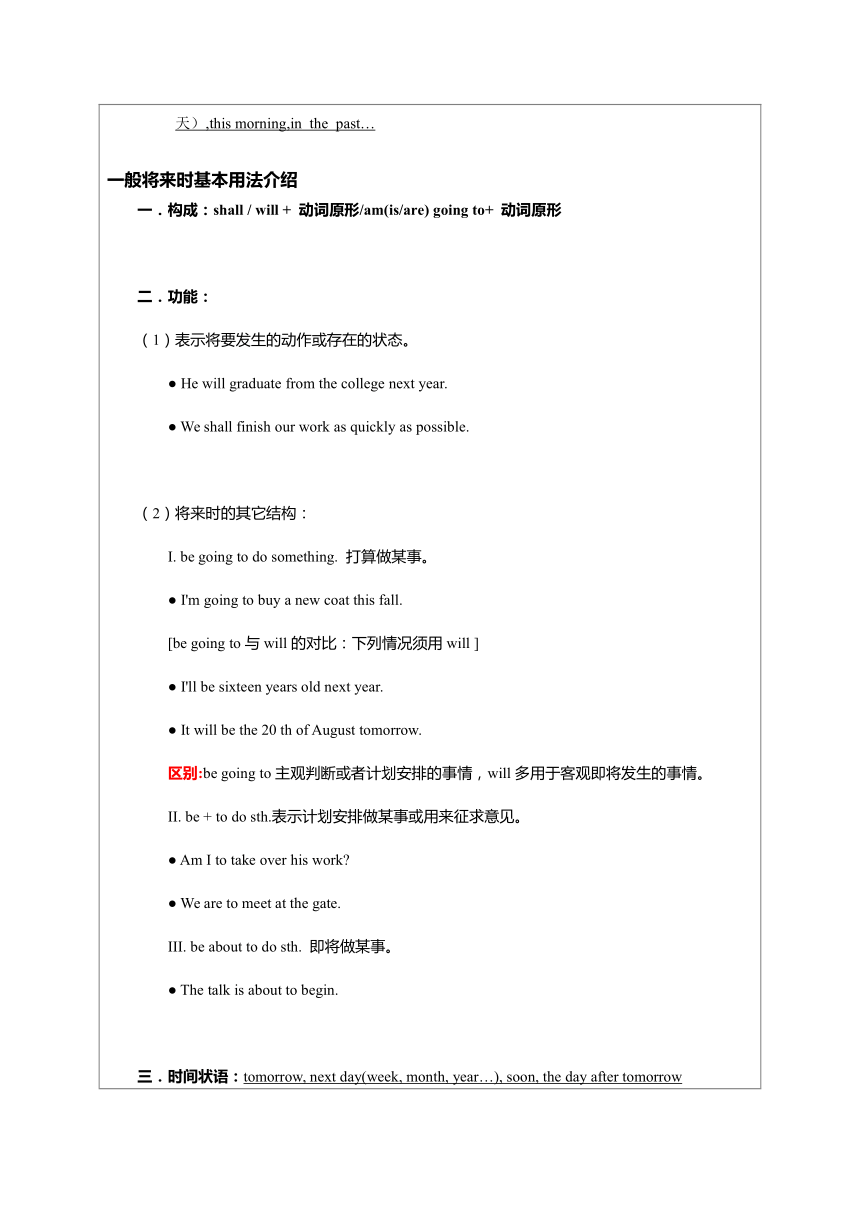
文档简介
八大时态的用法
一般现在时基本用法介绍
一.构成:使用动词原形,第三人称单数须有变化。(1)直接加“s”,work
→works,take
→takes
(2)以辅音加“y”结尾,变“y”为“i”,再加“es”
carry
→
carries(3)以“o,
s,
x,
ch,
sh”结尾的动词加“es”
go→
goes
watch→watches
二.功能:(1)表现在的事实、状态或动作:eg:
?.
Birds
fly.
?.
She
loves
music.
?.
Mary's
parents
get
up
very
early.
(2)表习惯性动作或职业,常与often,sometimes,usually,always,every
week,seldom,occasionally,frequently等时间副词连用。eg:
?.
I
always
take
a
walk
after
supper.
?.
She
writes
to
me
very
often.
?.
Tom
and
his
girlfriend
go
out
to
take
a
picnic
occasionally.
(3)表客观真理,格言警句或事实:?.
The
earth
moves
round
the
sun.
?.
The
sun
rises
in
the
east
and
sets
in
the
west.
?.
Two
and
two
makes
four.
?.
No
man
but
errs.
人非圣贤,熟能无过。(4)表将来:A.在由when,after,
before,as,as
soon
as,although,because,if,even
if,in
case,till,until,unless,so
long
as,where,whatever,wherever
等引导的状语从句中用一般现在时表将来发生的动作。(黄金重点,所有考试都不放过它!)eg:
?.
I'll
tell
her
when
shecomes
tomorrow.
?.
Even
ifit
rains
this
afternoon,
I'll
meet
you.?.
Whatever
happens,
you
should
keep
cool-headed.
(不错的句型,背下!!)?.
I'll
be
right
here
waiting
for
you
wherever
you
go.(很感人的句型!)B.按时间表示将要发生的动作或事件,用一般现在时表达将来时概念。?.
The
play
begins
at
6:30
this
evening.
?.
When
does
the
plane
take
off?
?.
He
leaves
for
that
city
next
week.
?.
According
to
the
timetable,the
express
train
to
Shanghai
starts
at
nine
in
the
morning.
三.时间状语:?always,often,?usually,sometimes,never,rarely,
seldom,hardly,every,once
a
week,on
Sundays,in
the
morning…一般过去时基本用法介绍
一.构成:过去式1.一般在动词末尾加-ed,如:pull-pulled,
cook-cooked2.结尾是e加d,如:taste-tasted3.末尾是"辅元辅"结尾的重读闭音节,应双写末尾的辅音字母,再加-ed,如:
stop-stopped
shop-shoppped
drop-dropped4.以“辅音字母+y”结尾的,变y为i,
再加-ed,如:study-studied5.不规则动词过去式:需要特殊记忆。is---was
are--were
have---had
do--did
go--went
二.功能:(1)表示过去某个特定时间或某一段时间发生的动作或情况。?.
We
visited
the
school
last
spring.?.
I
went
to
school
by
bike
when
I
was
in
middle
school.
?.
China
was
founded
in
1949.
(2)在表示时间或条件等的状语从句中代替过去将来时。?.
She
told
me
that
she
would
not
go
with
us
if
it
rained
the
next
day.?.
They
would
not
leave
until
she
came
back.?.
My
friend
promised
to
marry
me
once
she
made
her
final
decision.(3)一般过去时,现在时和过去时的几组差异:●
Her
brother
was
a
chemist.(已去世)
●
Her
brother
is
a
chemist.(尚健在)
●
That's
all
I
had
to
say.(话已说完)
●
That's
all
I
have
to
say.(言之未尽)
三.时间状语:yesterday,
just
now,
last
night,
in
2008,...ago,the
day
before
yesterday(前
天),this
morning,in??the??past…一般将来时基本用法介绍
一.构成:shall
/
will
+
动词原形/am(is/are)
going
to+
动词原形
二.功能:(1)表示将要发生的动作或存在的状态。●
He
will
graduate
from
the
college
next
year.
●
We
shall
finish
our
work
as
quickly
as
possible.
(2)将来时的其它结构:I.
be
going
to
do
something.
打算做某事。
●
I'm
going
to
buy
a
new
coat
this
fall.
[be
going
to与will的对比:下列情况须用will
]
●
I'll
be
sixteen
years
old
next
year.
●
It
will
be
the
20
th
of
August
tomorrow.
区别:be
going
to主观判断或者计划安排的事情,will多用于客观即将发生的事情。II.
be
+
to
do
sth.表示计划安排做某事或用来征求意见。●
Am
I
to
take
over
his
work?
●
We
are
to
meet
at
the
gate.
III.
be
about
to
do
sth.
即将做某事。●
The
talk
is
about
to
begin.
三.时间状语:tomorrow,
next
day(week,
month,
year…),
soon,
the
day
after
tomorrow
(后天)in
two
days...,in(the)
future等现在进行时基本用法介绍
一.构成:is
/
am
/
are
+
现在分词1.一般情况下,直接加ing,如:cook-cooking2.以不发音的e结尾,去e加ing,如:make-making,
taste-tasting但动词词尾是字母组合ee的,就不能去掉词尾e,而应直接加-ing。
如:
see-seeing3.如果末尾是"辅元辅"结尾的,双写末尾的辅音字母,再加ing,
如:run-running,
sit―
sitting
put―
putting
begin―
beginning
get―
getting
swim―
swimming
shop—shopping
chat—chatting
stop-stopping
drop-dropping
prefer-preferred
admit-admitted4.少数几个以ie结尾的动词,变ie为y再加-ing。
如:die-dying
lie-lying
tie-tying二.功能:(1)表示现在正在进行的动作。?.
The
kettle
is
boiling.
Shall
I
make
tea?
?.
Don't
you
think
you
eat
too
much?
You're
putting
on
weight(体重增加)。
?.
The
workers
are
building
a
new
bridge
across
the
river.
(2)表现阶段正进行的动作。?.
He
is
taking
physics
this
semester(本学期)。?.
Weare
preparing
for
our
final
examination
this
week.
go,
come,
leave,
arrive,
land,
meet,
die,
start,
return,
join,
etc.
用于进行时态时表示即将开始的动作。
?.
Look!
The
bus
is
coming.看!车来了!?.
The
old
man
is
seriously
ill,
and
he
is
dying.
?.
Alice
is
leaving
for
Beijing
with
her
mother.与
always,
forever,
continually,
constantly
等副词连用,表示说话人带有感彩:赞赏或厌恶。?.
He
is
always
thinking
of
others.(他总是想着别人。)?.
The
boy
is
continually
making
noises.(这男孩不断地发出吵闹声。)?.
The
teacher
is
constantly
(always)
criticizing
her
for
being
late.(老师一直在批评她迟到。)(5)下面表示状态、感觉、情绪、精神活动的动词不可用于进行时。(此条戒律请背
10遍!!!)believe(相信),see(看见),hear(听见)
,know(知道),understand
(理解),belong(属于),think(认为),consider(认为),feel(觉得),look(看起来),
seem(看上去),show(显示),mind(介意),have(有),sound(听起来),taste(尝起来),
require(要求),care(关心),like(喜欢),hate(讨厌),love(喜爱)等。注意:have
a
party
/
think
about可以用进行时,have意为“举行”;think意为“考虑”。
三.时间状语:now,
look,
listen,
at
the
moment(此时此刻),
it’s+时刻,right
now,at
present,these
days,Be
quiet!/Don't
talk,at
7:30
in
the
morning(准确的现在时间)过去进行时基本用法介绍
一.构成:were
/
was
+
现在分词二.功能:(1)表示过去某一时刻或阶段正在发生的动作。?.
I
was
playing
chess
at
8
yesterday
evening.
?.
When
I
arrived,
they
were
watching
TV.
?.
They
were
doing
housework
this
time
last
week.
(2)用于条件状语从句中表示过去将来进行的动作。?.
She
told
me
to
wake
him
up
if
she
was
sleeping.
?.
I
asked
my
friend
to
warn
me
about
it
as
long
as
I
was
driving
too
fast.
(3)过去某时将发生的事。?.
They
told
me
that
they
were
leaving
for
New
York.
?.
He
was
going
out
when
I
arrived.
时间状语:
常与过去某一特定的时间状语连用,如:
1)
时间点+过去时(at
8:00
yesterday)
2)时间段+过去时(from
7
to
9
last
night)
3)at
that
time,
the
whole
morning,(at)
this
time
yesterday...
4)也有时没有时间状语,要通过上下文的暗示来确定用过去进行时。
eg.
The
students
all
worked
hard.
Everyone
knew
what
he
was
working
for.
5)when/while引导的时间状语从句中过去将来时基本用法介绍
一.构成:①should
/
would
+
动词原形
②was/were
going
to
+
do二.功能:(1)表示从过去某个时刻看将要发生的动作或状态。He
said
that
they
would
meet
me
at
the
station.
(2)was/
were
+
going
to+动词原形 (a)按计划或安排即将发生的事(b)根据当时情况判断有可能但不一定会发生某事。e.g.It
seemed
as
if
it
was
going
to
rain. 三.时间状语:该时态常用于宾语从句或间接引语中,
主句的谓语动词常常是过去时。现在完成时基本用法介绍
一.构成:have
/
has
+
过去分词二.功能:(1)表示过去所发生的动作对现在的影响或产生的结果。常与yet,just,before,recently,lately(最近),ever,never等表时间的副词搭配使用。?.
He
hasn't
seen
her
lately.
/
I
haven't
finished
the
book
yet.
(2)表示一个从过去某个时间开始,延续到现在并可能持续下去的动作,常与表示一段时间的时间状语连用。如:so
far(迄今为止),up
till
now(直到现在),since,
for
a
long
time(很长时间),up
to
present(直到现在),in
the
past
/
in
the
last
few
years(在过去的几年里),
these
days(目前)……
?.
He
has
worked
here
for
15
years.
?.
I
have
studied
English
since
I
came
here.?.
The
foreigner
has
been
away
from
China
for
a
long
time.
?.
So
far,
I
haven't
received
a
single
letter
from
my
brother.
某些非延续性动词(即:动作开始便终止的动词),在现在完成时中不能与表示一段时间状语搭配。●
She
has
gone
away
for
a
month.(误)●
She
has
been
away
for
a
month
(正)●
The
man
has
died
for
two
years.(误)●
The
man
has
been
dead
for
two
years.(正)黄金要点:常见的非延续动词:die,arrive/come,join,leave/go,finish,buy,borrow,start/begin
...这类动词并非不能用现在完成时,而是不能接常由for引导的时间状语。但若是用在否定句中,非延续动词的现在完成时可以与表示一段时间的状语连用。
e
g
:I
haven’t
seen
him
for
a
long
time.(4)注意
since的用法:?.
They
haven't
had
any
trouble
since
they
came
here.?.
It
has
been
ten
years
since
we
met
last
time.
It
is(has
been)+
时间段
+
since…
“自从……以来有一段时间了”
其中要求since引导的从句必须采用一般过去时,而主句是一般现在时或现在完成时。三.时间状语:already(已经),
yet(尚且没有)never(从不),
ever(曾经),
just(刚才,
before(之前),since(自从),for(持续),so
far(迄今为止),
up
to
now=up
till
now(到目前为止),recently(最近),lately(近来),in
the
past/last+过去的时间,频率副词(often,
sometimes...),表示次数(once,twice...)
过去完成时基本用法介绍
一.构成:had
+
过去分词二.功能:(1)用在主句为一般过去时的宾语从句中。如told,
said,
knew,
thought等动词后的宾语从句。
eg:My
father
asked
me
if
I
had
finished
reading
that
book.
(2)用在“after
/
before
/
when
+
过去时态引导的时间状语从句
eg:When
I
got
to
the
station,
the
train
had
already
left.
eg:After
he
had
finished
his
homework,
he
went
to
bed.
注意:before,
after
引导的时间状语从句中,由于before
和
after
本身已表达了动作的先后
关系,若主、从句表示的动作紧密相连,则主、从句都用一般过去时。如:
eg:Where
did
you
study
before
you
came
here?eg:After
he
closed
the
door,
he
left
the
classroom.三.时间状语:(1).
By
the
time
sb.
did
sth.
e.g.
By
the
time
the
police
arrived
at
the
shop,
the
owner
of
the
shop
had
caught
the
thief.
(2).
When/After
sb.
did
sth.(动作有先后发生的顺序)
e.g.
When
we
reached
the
station
hurriedly,
the
train
had
left.
(3).
Before
sb.
did
sth.
e.g.
Before
I
went
to
bed
last
night,
I
had
done
my
homework.
IV.Choose
the
best
answer.选择填空。(错误率:
掌握情况:
)1.A:
Have
you
seen
Mrs.
Smith
lately?B:
No.
She
______
Australia
for
business.
She’ll
come
back
in
two
days.A.
has
comes
to
B.
has
come
to
C.
has
gone
to
D.
has
been
to2.Joan
can’t
join
us.
She
______
for
the
lesson
she
will
have
next
week.A.prepares
B.
will
prepare
C.
is
preparing
D.
prepared3.His
father
______
from
England
in
three
days.A.
returns
B.
has
returned
C.
will
return
D.
returned4.The
world’s
biggest
e-business
________
making
Single’s
Day
shopping
celebration
in
2009.A.
begins
B.
began
C.
was
beginning
D.
has
begun5.Tim
______a
detective
story
written
by
Arthur
Conan
Doyle
this
time
yesterday.A.
read
B.
reads
C.
was
reading
D.
is
reading6.Doris
dancing
in
the
school
club
for
about
ten
months
and
can
dance
well
now.A.
is
learning
B.
will
learn
C.
learns
D.
has
learned7.
Kevin
promises
that
if
anyone
has
difficulties
in
the
job,
he
the
first
one
to
help.A.
will
be
B.
would
be
C.
was
D.
has
been8.If
I
_______
too
much
coffee,
I
have
to
run
to
the
bathroom
all
day
long.A.
drink
B.
am
drinking
C.
drank
D.
will
drink9.
By
the
time
I
found
the
website,
they
_______
all
the
tickets.A.
are
selling
B.
have
sold
C.
had
sold
D.
will
sell10.Nancy_______lots
of
work
for
the
school
union
since
she
went
to
university.A.
did
B.
will
do
C.
has
done
D.
had
done11.
Many
journalists
_____the
police
about
the
international
case
a
while
ago.A.
interviewed
B.
interview
C.
are
interviewing
D.
had
interviewed12.
Oh,
my
god.
The
children
_____
an
awful
mess
in
the
kitchen!
I
have
to
clean
it.A.
are
making
B.
have
made
C.
will
make
D.
made13.The
poor
family
________when
the
flash
flood
struck
the
village
at
midnight.A.
sleep
B.
slept
C.
have
slept
D.
were
sleeping14.
Tim’s
sister
______as
a
waitress
in
a
big
restaurant
for
the
time
being.A.was
working
B.
worked
C.
has
worked
D.
is
working15.In
the
2017
FINA
world
championships,
Katie
Ledecky
_________
the
women’s
1500
metre
freestyle(自由泳).A.
has
won
B.
wins
C.
won
D.
will
win16.David
knows
much
about
the
city
because
he
_____
there
three
times.A.
had
gone
B.
had
been
C.
has
gone
D.
has
been17.
When
the
traffic
accident
______,
I
was
taking
a
walk
with
my
pet
dog
by
the
road.A.
happened
B.
happen
C.
would
happen
D.
happens18.
Nancy
_______
for
the
speech
contest
while
her
classmates
were
watching
the
game.A)
is
preparing
B)
has
prepared
C)
was
preparing
D)
will
prepare19.
People
throughout
the
world
__________together
now
to
protect
the
natural
environment.A.
are
working
B.
worked
C.
will
work
D.
have
worked20.
The
living
conditions
in
the
countryside
_____
greatly
in
recent
years.A.improve
B.
improved
C.
has
improved
D.
will
improveKeys:
1-5
CCCBC
6-10
DAACC
11-15
ABDDC
16-20
DACAC
Grammar--Tense
一般现在时基本用法介绍
一.构成:使用动词原形,第三人称单数须有变化。(1)直接加“s”,work
→works,take
→takes
(2)以辅音加“y”结尾,变“y”为“i”,再加“es”
carry
→
carries(3)以“o,
s,
x,
ch,
sh”结尾的动词加“es”
go→
goes
watch→watches
二.功能:(1)表现在的事实、状态或动作:eg:
?.
Birds
fly.
?.
She
loves
music.
?.
Mary's
parents
get
up
very
early.
(2)表习惯性动作或职业,常与often,sometimes,usually,always,every
week,seldom,occasionally,frequently等时间副词连用。eg:
?.
I
always
take
a
walk
after
supper.
?.
She
writes
to
me
very
often.
?.
Tom
and
his
girlfriend
go
out
to
take
a
picnic
occasionally.
(3)表客观真理,格言警句或事实:?.
The
earth
moves
round
the
sun.
?.
The
sun
rises
in
the
east
and
sets
in
the
west.
?.
Two
and
two
makes
four.
?.
No
man
but
errs.
人非圣贤,熟能无过。(4)表将来:A.在由when,after,
before,as,as
soon
as,although,because,if,even
if,in
case,till,until,unless,so
long
as,where,whatever,wherever
等引导的状语从句中用一般现在时表将来发生的动作。(黄金重点,所有考试都不放过它!)eg:
?.
I'll
tell
her
when
shecomes
tomorrow.
?.
Even
ifit
rains
this
afternoon,
I'll
meet
you.?.
Whatever
happens,
you
should
keep
cool-headed.
(不错的句型,背下!!)?.
I'll
be
right
here
waiting
for
you
wherever
you
go.(很感人的句型!)B.按时间表示将要发生的动作或事件,用一般现在时表达将来时概念。?.
The
play
begins
at
6:30
this
evening.
?.
When
does
the
plane
take
off?
?.
He
leaves
for
that
city
next
week.
?.
According
to
the
timetable,the
express
train
to
Shanghai
starts
at
nine
in
the
morning.
三.时间状语:?always,often,?usually,sometimes,never,rarely,
seldom,hardly,every,once
a
week,on
Sundays,in
the
morning…一般过去时基本用法介绍
一.构成:过去式1.一般在动词末尾加-ed,如:pull-pulled,
cook-cooked2.结尾是e加d,如:taste-tasted3.末尾是"辅元辅"结尾的重读闭音节,应双写末尾的辅音字母,再加-ed,如:
stop-stopped
shop-shoppped
drop-dropped4.以“辅音字母+y”结尾的,变y为i,
再加-ed,如:study-studied5.不规则动词过去式:需要特殊记忆。is---was
are--were
have---had
do--did
go--went
二.功能:(1)表示过去某个特定时间或某一段时间发生的动作或情况。?.
We
visited
the
school
last
spring.?.
I
went
to
school
by
bike
when
I
was
in
middle
school.
?.
China
was
founded
in
1949.
(2)在表示时间或条件等的状语从句中代替过去将来时。?.
She
told
me
that
she
would
not
go
with
us
if
it
rained
the
next
day.?.
They
would
not
leave
until
she
came
back.?.
My
friend
promised
to
marry
me
once
she
made
her
final
decision.(3)一般过去时,现在时和过去时的几组差异:●
Her
brother
was
a
chemist.(已去世)
●
Her
brother
is
a
chemist.(尚健在)
●
That's
all
I
had
to
say.(话已说完)
●
That's
all
I
have
to
say.(言之未尽)
三.时间状语:yesterday,
just
now,
last
night,
in
2008,...ago,the
day
before
yesterday(前
天),this
morning,in??the??past…一般将来时基本用法介绍
一.构成:shall
/
will
+
动词原形/am(is/are)
going
to+
动词原形
二.功能:(1)表示将要发生的动作或存在的状态。●
He
will
graduate
from
the
college
next
year.
●
We
shall
finish
our
work
as
quickly
as
possible.
(2)将来时的其它结构:I.
be
going
to
do
something.
打算做某事。
●
I'm
going
to
buy
a
new
coat
this
fall.
[be
going
to与will的对比:下列情况须用will
]
●
I'll
be
sixteen
years
old
next
year.
●
It
will
be
the
20
th
of
August
tomorrow.
区别:be
going
to主观判断或者计划安排的事情,will多用于客观即将发生的事情。II.
be
+
to
do
sth.表示计划安排做某事或用来征求意见。●
Am
I
to
take
over
his
work?
●
We
are
to
meet
at
the
gate.
III.
be
about
to
do
sth.
即将做某事。●
The
talk
is
about
to
begin.
三.时间状语:tomorrow,
next
day(week,
month,
year…),
soon,
the
day
after
tomorrow
(后天)in
two
days...,in(the)
future等现在进行时基本用法介绍
一.构成:is
/
am
/
are
+
现在分词1.一般情况下,直接加ing,如:cook-cooking2.以不发音的e结尾,去e加ing,如:make-making,
taste-tasting但动词词尾是字母组合ee的,就不能去掉词尾e,而应直接加-ing。
如:
see-seeing3.如果末尾是"辅元辅"结尾的,双写末尾的辅音字母,再加ing,
如:run-running,
sit―
sitting
put―
putting
begin―
beginning
get―
getting
swim―
swimming
shop—shopping
chat—chatting
stop-stopping
drop-dropping
prefer-preferred
admit-admitted4.少数几个以ie结尾的动词,变ie为y再加-ing。
如:die-dying
lie-lying
tie-tying二.功能:(1)表示现在正在进行的动作。?.
The
kettle
is
boiling.
Shall
I
make
tea?
?.
Don't
you
think
you
eat
too
much?
You're
putting
on
weight(体重增加)。
?.
The
workers
are
building
a
new
bridge
across
the
river.
(2)表现阶段正进行的动作。?.
He
is
taking
physics
this
semester(本学期)。?.
Weare
preparing
for
our
final
examination
this
week.
go,
come,
leave,
arrive,
land,
meet,
die,
start,
return,
join,
etc.
用于进行时态时表示即将开始的动作。
?.
Look!
The
bus
is
coming.看!车来了!?.
The
old
man
is
seriously
ill,
and
he
is
dying.
?.
Alice
is
leaving
for
Beijing
with
her
mother.与
always,
forever,
continually,
constantly
等副词连用,表示说话人带有感彩:赞赏或厌恶。?.
He
is
always
thinking
of
others.(他总是想着别人。)?.
The
boy
is
continually
making
noises.(这男孩不断地发出吵闹声。)?.
The
teacher
is
constantly
(always)
criticizing
her
for
being
late.(老师一直在批评她迟到。)(5)下面表示状态、感觉、情绪、精神活动的动词不可用于进行时。(此条戒律请背
10遍!!!)believe(相信),see(看见),hear(听见)
,know(知道),understand
(理解),belong(属于),think(认为),consider(认为),feel(觉得),look(看起来),
seem(看上去),show(显示),mind(介意),have(有),sound(听起来),taste(尝起来),
require(要求),care(关心),like(喜欢),hate(讨厌),love(喜爱)等。注意:have
a
party
/
think
about可以用进行时,have意为“举行”;think意为“考虑”。
三.时间状语:now,
look,
listen,
at
the
moment(此时此刻),
it’s+时刻,right
now,at
present,these
days,Be
quiet!/Don't
talk,at
7:30
in
the
morning(准确的现在时间)过去进行时基本用法介绍
一.构成:were
/
was
+
现在分词二.功能:(1)表示过去某一时刻或阶段正在发生的动作。?.
I
was
playing
chess
at
8
yesterday
evening.
?.
When
I
arrived,
they
were
watching
TV.
?.
They
were
doing
housework
this
time
last
week.
(2)用于条件状语从句中表示过去将来进行的动作。?.
She
told
me
to
wake
him
up
if
she
was
sleeping.
?.
I
asked
my
friend
to
warn
me
about
it
as
long
as
I
was
driving
too
fast.
(3)过去某时将发生的事。?.
They
told
me
that
they
were
leaving
for
New
York.
?.
He
was
going
out
when
I
arrived.
时间状语:
常与过去某一特定的时间状语连用,如:
1)
时间点+过去时(at
8:00
yesterday)
2)时间段+过去时(from
7
to
9
last
night)
3)at
that
time,
the
whole
morning,(at)
this
time
yesterday...
4)也有时没有时间状语,要通过上下文的暗示来确定用过去进行时。
eg.
The
students
all
worked
hard.
Everyone
knew
what
he
was
working
for.
5)when/while引导的时间状语从句中过去将来时基本用法介绍
一.构成:①should
/
would
+
动词原形
②was/were
going
to
+
do二.功能:(1)表示从过去某个时刻看将要发生的动作或状态。He
said
that
they
would
meet
me
at
the
station.
(2)was/
were
+
going
to+动词原形 (a)按计划或安排即将发生的事(b)根据当时情况判断有可能但不一定会发生某事。e.g.It
seemed
as
if
it
was
going
to
rain. 三.时间状语:该时态常用于宾语从句或间接引语中,
主句的谓语动词常常是过去时。现在完成时基本用法介绍
一.构成:have
/
has
+
过去分词二.功能:(1)表示过去所发生的动作对现在的影响或产生的结果。常与yet,just,before,recently,lately(最近),ever,never等表时间的副词搭配使用。?.
He
hasn't
seen
her
lately.
/
I
haven't
finished
the
book
yet.
(2)表示一个从过去某个时间开始,延续到现在并可能持续下去的动作,常与表示一段时间的时间状语连用。如:so
far(迄今为止),up
till
now(直到现在),since,
for
a
long
time(很长时间),up
to
present(直到现在),in
the
past
/
in
the
last
few
years(在过去的几年里),
these
days(目前)……
?.
He
has
worked
here
for
15
years.
?.
I
have
studied
English
since
I
came
here.?.
The
foreigner
has
been
away
from
China
for
a
long
time.
?.
So
far,
I
haven't
received
a
single
letter
from
my
brother.
某些非延续性动词(即:动作开始便终止的动词),在现在完成时中不能与表示一段时间状语搭配。●
She
has
gone
away
for
a
month.(误)●
She
has
been
away
for
a
month
(正)●
The
man
has
died
for
two
years.(误)●
The
man
has
been
dead
for
two
years.(正)黄金要点:常见的非延续动词:die,arrive/come,join,leave/go,finish,buy,borrow,start/begin
...这类动词并非不能用现在完成时,而是不能接常由for引导的时间状语。但若是用在否定句中,非延续动词的现在完成时可以与表示一段时间的状语连用。
e
g
:I
haven’t
seen
him
for
a
long
time.(4)注意
since的用法:?.
They
haven't
had
any
trouble
since
they
came
here.?.
It
has
been
ten
years
since
we
met
last
time.
It
is(has
been)+
时间段
+
since…
“自从……以来有一段时间了”
其中要求since引导的从句必须采用一般过去时,而主句是一般现在时或现在完成时。三.时间状语:already(已经),
yet(尚且没有)never(从不),
ever(曾经),
just(刚才,
before(之前),since(自从),for(持续),so
far(迄今为止),
up
to
now=up
till
now(到目前为止),recently(最近),lately(近来),in
the
past/last+过去的时间,频率副词(often,
sometimes...),表示次数(once,twice...)
过去完成时基本用法介绍
一.构成:had
+
过去分词二.功能:(1)用在主句为一般过去时的宾语从句中。如told,
said,
knew,
thought等动词后的宾语从句。
eg:My
father
asked
me
if
I
had
finished
reading
that
book.
(2)用在“after
/
before
/
when
+
过去时态引导的时间状语从句
eg:When
I
got
to
the
station,
the
train
had
already
left.
eg:After
he
had
finished
his
homework,
he
went
to
bed.
注意:before,
after
引导的时间状语从句中,由于before
和
after
本身已表达了动作的先后
关系,若主、从句表示的动作紧密相连,则主、从句都用一般过去时。如:
eg:Where
did
you
study
before
you
came
here?eg:After
he
closed
the
door,
he
left
the
classroom.三.时间状语:(1).
By
the
time
sb.
did
sth.
e.g.
By
the
time
the
police
arrived
at
the
shop,
the
owner
of
the
shop
had
caught
the
thief.
(2).
When/After
sb.
did
sth.(动作有先后发生的顺序)
e.g.
When
we
reached
the
station
hurriedly,
the
train
had
left.
(3).
Before
sb.
did
sth.
e.g.
Before
I
went
to
bed
last
night,
I
had
done
my
homework.
IV.Choose
the
best
answer.选择填空。(错误率:
掌握情况:
)1.A:
Have
you
seen
Mrs.
Smith
lately?B:
No.
She
______
Australia
for
business.
She’ll
come
back
in
two
days.A.
has
comes
to
B.
has
come
to
C.
has
gone
to
D.
has
been
to2.Joan
can’t
join
us.
She
______
for
the
lesson
she
will
have
next
week.A.prepares
B.
will
prepare
C.
is
preparing
D.
prepared3.His
father
______
from
England
in
three
days.A.
returns
B.
has
returned
C.
will
return
D.
returned4.The
world’s
biggest
e-business
________
making
Single’s
Day
shopping
celebration
in
2009.A.
begins
B.
began
C.
was
beginning
D.
has
begun5.Tim
______a
detective
story
written
by
Arthur
Conan
Doyle
this
time
yesterday.A.
read
B.
reads
C.
was
reading
D.
is
reading6.Doris
dancing
in
the
school
club
for
about
ten
months
and
can
dance
well
now.A.
is
learning
B.
will
learn
C.
learns
D.
has
learned7.
Kevin
promises
that
if
anyone
has
difficulties
in
the
job,
he
the
first
one
to
help.A.
will
be
B.
would
be
C.
was
D.
has
been8.If
I
_______
too
much
coffee,
I
have
to
run
to
the
bathroom
all
day
long.A.
drink
B.
am
drinking
C.
drank
D.
will
drink9.
By
the
time
I
found
the
website,
they
_______
all
the
tickets.A.
are
selling
B.
have
sold
C.
had
sold
D.
will
sell10.Nancy_______lots
of
work
for
the
school
union
since
she
went
to
university.A.
did
B.
will
do
C.
has
done
D.
had
done11.
Many
journalists
_____the
police
about
the
international
case
a
while
ago.A.
interviewed
B.
interview
C.
are
interviewing
D.
had
interviewed12.
Oh,
my
god.
The
children
_____
an
awful
mess
in
the
kitchen!
I
have
to
clean
it.A.
are
making
B.
have
made
C.
will
make
D.
made13.The
poor
family
________when
the
flash
flood
struck
the
village
at
midnight.A.
sleep
B.
slept
C.
have
slept
D.
were
sleeping14.
Tim’s
sister
______as
a
waitress
in
a
big
restaurant
for
the
time
being.A.was
working
B.
worked
C.
has
worked
D.
is
working15.In
the
2017
FINA
world
championships,
Katie
Ledecky
_________
the
women’s
1500
metre
freestyle(自由泳).A.
has
won
B.
wins
C.
won
D.
will
win16.David
knows
much
about
the
city
because
he
_____
there
three
times.A.
had
gone
B.
had
been
C.
has
gone
D.
has
been17.
When
the
traffic
accident
______,
I
was
taking
a
walk
with
my
pet
dog
by
the
road.A.
happened
B.
happen
C.
would
happen
D.
happens18.
Nancy
_______
for
the
speech
contest
while
her
classmates
were
watching
the
game.A)
is
preparing
B)
has
prepared
C)
was
preparing
D)
will
prepare19.
People
throughout
the
world
__________together
now
to
protect
the
natural
environment.A.
are
working
B.
worked
C.
will
work
D.
have
worked20.
The
living
conditions
in
the
countryside
_____
greatly
in
recent
years.A.improve
B.
improved
C.
has
improved
D.
will
improveKeys:
1-5
CCCBC
6-10
DAACC
11-15
ABDDC
16-20
DACAC
Grammar--Tense
同课章节目录
- 词法
- 名词
- 动词和动词短语
- 动词语态
- 动词时态
- 助动词和情态动词
- 非谓语动词
- 冠词
- 代词
- 数词和量词
- 形容词副词及其比较等级
- 介词和介词短语
- 连词和感叹词
- 构词法
- 相似、相近词比较
- 句法
- 陈述句
- 一般疑问句和否定疑问句
- 特殊疑问句及选择疑问句
- 反意疑问句
- 存在句(There be句型)
- 宾语从句
- 定语从句
- 状语从句
- 主谓一致问题
- 简单句
- 并列句
- 复合句
- 主谓一致
- 主、表语从句
- 名词性从句
- 直接引语和间接引语
- 虚拟语气
- 感叹句
- 强调句
- 倒装句
- 祈使句
- 句子的成分
- 句子的分类
- 题型专区
- 单项选择部分
- 易错题
- 完形填空
- 阅读理解
- 词汇练习
- 听说训练
- 句型转换
- 补全对话
- 短文改错
- 翻译
- 书面表达
- 任务型阅读
- 语法填空
- 其他资料
